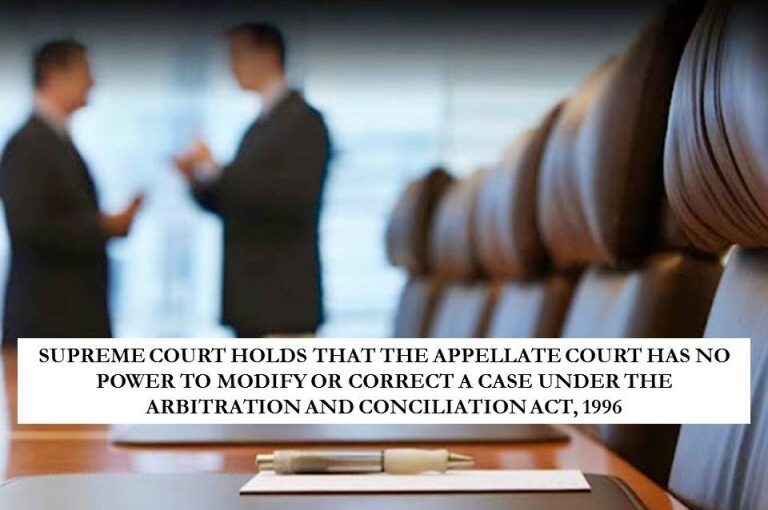SUPREME COURT HOLDS THAT THE APPELLATE COURT HAS NO POWER TO MODIFY OR CORRECT A CASE UNDER THE ARBITRATION AND CONCILIATION ACT, 1996
The Hon’ble Bench of the #SupremeCourt in the case of the Project Director, National Highways No. 45 E and 220 National Highways Authority of India v M. Hakeem & Anr. [LL 2021 SC 311] vide its #Judgment dated 20-07-2021 held that the #AppellateCourt only has the power to set-aside or remand a case under Section 34 of the Arbitration and Conciliation Act, 1996 [“#ArbitrationAct”] and it cannot #modify or correct an #award.
The facts in the present case, consists of awards passed by a competent authority namely a Special District Revenue Officer (Competent Authority) for acquisition of lands for purposes of constructing road. In all these cases, awards were made based on the ‘guideline value’ of the lands in question and not on the basis of sale deeds of similar lands.
This resulted in awarding of abysmally low amounts that were granted by the Competent Authority. As an example, in SLP (Civil) No.13020 of 2020, amounts ranging from Rs.46.55 to 83.15 per square meter were awarded. In the arbitral award made by the District Collector in all these cases, being an appointee of the Government, no infirmity was found in the aforesaid awards, as a result of which the same amount of compensation was given to all the claimants.
Thereafter, an amendment was made under the National Highways Act, 1997 (National Highways Act) and wholesome regime of appeals under the Land Acquisition Act was replaced by a regime in which an award was passed by an Arbitrator, who was not consensually appointed but to be appointed by the Central Government under the National Highways Act.
The aggrieved land owners approached the arbitrator for enhancement of the compensation however the Arbitrator passed the Awards without taking into consideration several facts and as such upheld the low amount of compensations awarded by the Competent Authority.
Aggrieved by the Awards the Claimants filed Section 34 petitions before the District and Sessions Judge. The learned Judge after hearing the Parties enhanced the compensation amounts to Rs.645 per square meter and the award of the Collector was therefore modified by the District Court in exercise of jurisdiction under Section 34 Arbitration Act. In the appeal filed by the Government to the Division Bench, the aforesaid modification was upheld and court further held that the case should be remanded back in order to fix compensation for certain trees and crops.
Dissatisfied with the High Court Order, the National Highways Authority filed an Appeal against the Madras High Court before the Supreme Court of India, whereby the legal issue raised before the Supreme Court was whether the power to “set aside” an award of an arbitrator would include the power to modify such an award under Section 34 of the Arbitration Act.
The Supreme Court held the aforesaid issue in negative and observed as follows:
- As Section 34 provides for limited judicial interference on extremely limited grounds for setting aside an award under Section 34 (2) and (3) of the Arbitration Act, which do not deal with the merits. This becomes further clear from sub-section (4), which provides that on receipt of an application under Section 34 (1), the court may adjourn the proceedings and give the arbitral tribunal an opportunity to resume the arbitral proceedings or take such action as will eliminate the grounds for setting aside the arbitral award. Thus, an application under Section 34 can be made only for setting aside an award.
- Section 34 proceeding does not contain any challenge on the merits of the Award. The court hearing a Section 34 petition does not sit in appeal.
- Unlike 1996 Arbitration Act, the old act i.e., Arbitration Act, 1940 the court had the power to modify or correct an award. An award may be remitted, modified or otherwise set aside given the grounds contained in Section 30 of the Arbitration Act, 1940, which are broader than the grounds contained in Section 34 of the Arbitration Act 1996.
- It further observed that the Awards made by the Competent Authority under the National Highways Act were based on the ‘guideline value’ of the lands and not on the sale deeds of similar lands.
- That the legislature cannot be allowed to say that the land which touches the national highway and which is acquired under the National Highways Act, will yield compensation much lesser than the adjacent land which is acquired under the Land Acquisition Act.
In view of the above the Supreme Court held that even though modification of Award is not permissible, court cannot ignore the fact that the Arbitrator had awarded the compensation on a completely perverse basis. The Court noticed that grave injustice would be done if the Awards are set aside and matter is remanded to the very Government Arbitrator, that too after 7-10 years. Hence, the Supreme Court did not interfere with the Awards.
Lakshmi Vishwakarma
Senior Legal Associate
The Indian Lawyer & Allied Services





































Leave a Reply